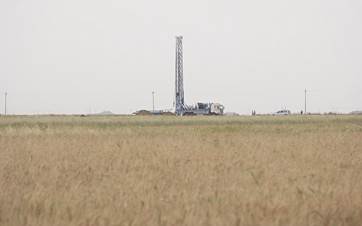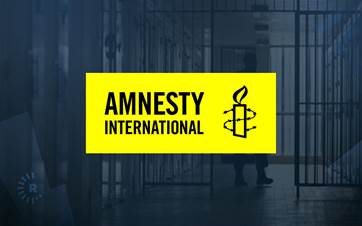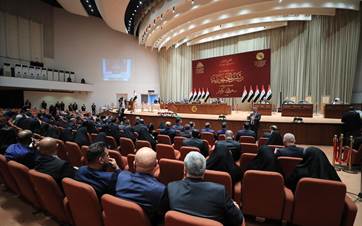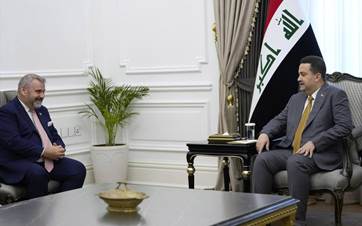Iraq


A man walks on saline soil near Razzaza Lake, also known as Lake Milh, Arabic for salt, in the Karbala governorate of Iraq, Feb. 14, 2022. Photo: AP
ERBIL, Kurdistan Region - The recent wave of rainfall across Iraq has increased the water levels of the country's second-largest lake and reduced its salinity, the head of Karbala province’s water resources directorate said on Wednesday.
“The rainfall in the holy governorate of Karbala and nearby areas led to a slight increase in the water levels of Lake Razzaza, improving its quality and reducing its salinity,” Hassnein Qahtan al-Awad told Iraqi state media.
Iraq witnessed a wave of cold and rainfall over the week, heavily affecting the levels of underground water and the country’s lakes.
Razzaza Lake, also known as Milh Lake, is located west of the city of Karbala.
The lake was once a popular destination for tourists to cool down during scorching summer temperatures. Over the past year, it experienced a dangerous drought, threatening the lives of locals.
The lake in February had almost completely dried up, with dead animals and large amounts of salt being the only visible remnant of the lake.
Locals have previously decried the Iraqi government’s inaction, calling on authorities to implement a plan to save the lake by releasing water from the Euphrates River.
Despite facing a strong wave of cold weather, rain, and snow in January, Iraq still suffered from the long-term effects of climate change.
Officials have warned for years that dams built by Iran and Turkey have contributed to a growing water crisis in the southern and central provinces of Iraq, as well as the northern Kurdistan Region. Iran has built around 600 dams over the last 30 years, cutting or diverting river courses from its territory into Iraq.
The country is the fifth-most vulnerable nation in the world to the effects of climate change, including water and food insecurity.
Last year, low rainfall levels and high temperatures caused by climate change depleted water supplies across the country. Much of Iraq’s agricultural lands depend on irrigation, and dams and reservoirs were at record-low levels in the summer of 2021.
“The rainfall in the holy governorate of Karbala and nearby areas led to a slight increase in the water levels of Lake Razzaza, improving its quality and reducing its salinity,” Hassnein Qahtan al-Awad told Iraqi state media.
Iraq witnessed a wave of cold and rainfall over the week, heavily affecting the levels of underground water and the country’s lakes.
Razzaza Lake, also known as Milh Lake, is located west of the city of Karbala.
The lake was once a popular destination for tourists to cool down during scorching summer temperatures. Over the past year, it experienced a dangerous drought, threatening the lives of locals.
The lake in February had almost completely dried up, with dead animals and large amounts of salt being the only visible remnant of the lake.
Locals have previously decried the Iraqi government’s inaction, calling on authorities to implement a plan to save the lake by releasing water from the Euphrates River.
Despite facing a strong wave of cold weather, rain, and snow in January, Iraq still suffered from the long-term effects of climate change.
Officials have warned for years that dams built by Iran and Turkey have contributed to a growing water crisis in the southern and central provinces of Iraq, as well as the northern Kurdistan Region. Iran has built around 600 dams over the last 30 years, cutting or diverting river courses from its territory into Iraq.
The country is the fifth-most vulnerable nation in the world to the effects of climate change, including water and food insecurity.
Last year, low rainfall levels and high temperatures caused by climate change depleted water supplies across the country. Much of Iraq’s agricultural lands depend on irrigation, and dams and reservoirs were at record-low levels in the summer of 2021.








Comments
Rudaw moderates all comments submitted on our website. We welcome comments which are relevant to the article and encourage further discussion about the issues that matter to you. We also welcome constructive criticism about Rudaw.
To be approved for publication, however, your comments must meet our community guidelines.
We will not tolerate the following: profanity, threats, personal attacks, vulgarity, abuse (such as sexism, racism, homophobia or xenophobia), or commercial or personal promotion.
Comments that do not meet our guidelines will be rejected. Comments are not edited – they are either approved or rejected.
Post a comment